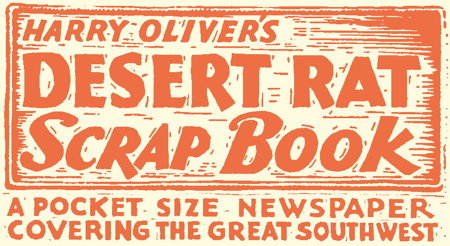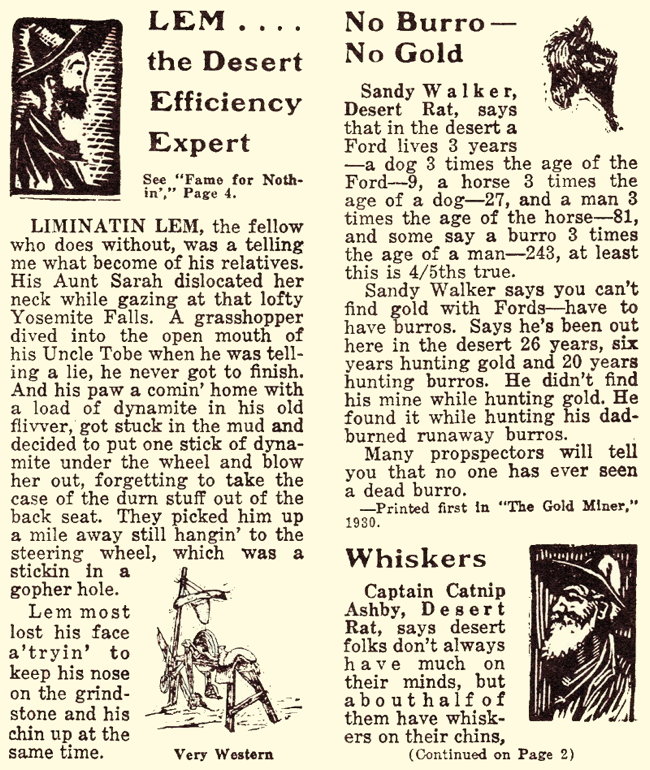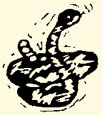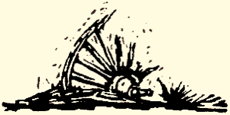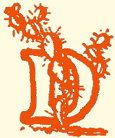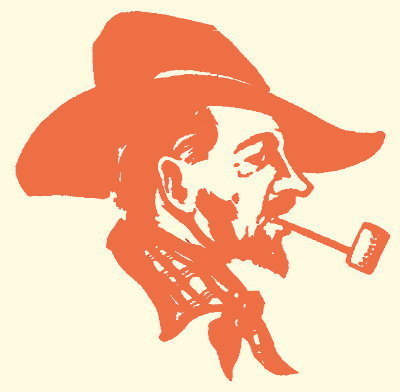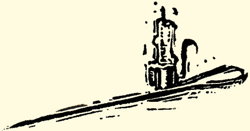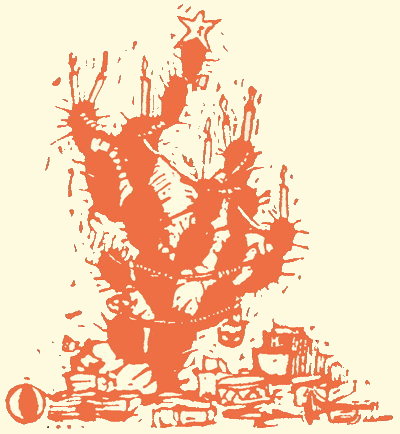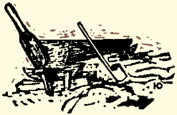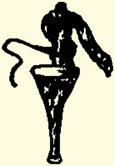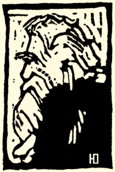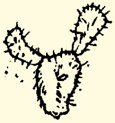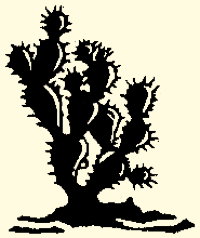BACK HOME COVER THIS IS HISTORICAL INFORMATION ONLY
C A M P E D I T I O N ~ S A D D L E B A G S I Z E
F A L L 1 9 4 6
PUBLISHED FOUR TIMES A YEAR
Price • One Thin Dime
Page 2 D E S E R T R A T S C R A P B O O K Fall Edition, 1946
This paper is not entered as 2nd class mail. It's a first class newspaper.
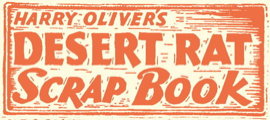
Smallest newspaper in the world and the only paged one.
Price 10¢ a copy, or 0¢ a year—Darned if I am going to the trouble of mailing it for nothing.
Published at Fort Oliver
1000 Palms, California
HARRY OLIVER
OWNER
PUBLISHER
EDITOR
Author and
DISTRIBUTOR
PICTURES ARE BY THE AUTHOR, MANY OF THEM ARE WOODCUTS—I did all but the spelling.
Most of this material, pictures and writing is copyrighted.
Permission to reprint from this newspaper is granted providing you mention the Editor, who is the publisher, once every inch of printed matter and the name of the paper every 1½ inch and end by telling the world they can get a copy by sending a thin dime to the Desert Trader at 1000 Palms, California.
Anyone forgetting to do this might find a sidewinder in his bed. HARRY (Desert Rat) Oliver.
This issue one half million printed — don't worry, I can use them for wrapping paper.
You will find this paper better than others for wrapping—It's Tough.
The newspaper that grows as you turn each page — excepting page 5.
THE 1ST EDITION CARRIES NO ADS. FUTURE EDITIONS WILL ONLY CONSIDER ADVERTISING COPY THAT WILL ADD COLOR BEYOND THE ABILITY OF THE EDITOR. SO IF YOUR ADVERTISING COPY IS BETTER READING THAN MY STUFF SHOOT IT ALONG!
Newspaper men, this publication of mine is probably the most egotistical you have ever seen; but don't you wish you had done it!
Campfire Ammunition
After years of writing of the Desert, I present this Desert Scrap Book with its strange facts, desert oddities, and bits of humor, that you may enlarge on them, until they take their place as Desert Folklore.
You will find Legends, and Tall Tales will grow like dust devils with your te-telling, so when they call on you at the camp fire, make your story tall and give it a home in your own Desert Valley.
That's the reason of this little newspaper, or one of the reasons, the other is that I never had a newspaper of my own before and I think it will be a lot of fun.
Harry Oliver
EDITOR
On the old road from the desert to San Diego there is a very dangerous precipice. An old timer told me they had a warning sign up for two years, but no one fell over so they took it down.
•
Doc A. A. Beaty said that it was so hot this summer on the Borego ranch that the lizards hung by their tails on the shady side of the cactus to keep their bellies from frying.
•
The Scorpion carries her young on her back. If one falls off she eats it. When they grow up they eat her. The insect stings with her tail, causing temporary paralysis and sometimes death.
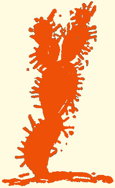
YES BUT we havent got enough with that spirit. We talk more independence than we practice. Here is an interesting letter from an old friend of mine, Harry Oliver. He was an art director for our movie company (Fox). Thats the man that arranges all the "Sets." That's the houses and scenes that we shoot. Well he is quite a desert rat, and has a place away out on the desert, and he is head of the big amusement place called Gold Gulch at the big San Diego Exposition, which you don't want to miss. Its going to be a big fair. He is putting on a "Mule Swearing Contest." That is its prizes for the man that can cuss a mule the best, or worst. They are importing real Missouri Mules. He has a lazy dog contest, where thare is handsome prizes for the laziest dog, including the owner.
Then he has a special contest just for residents from Florida, who can tell the biggest lie about California, (or maybe it won't be a lie, but the Californians will call it a lie). I can't imagine what it would be if it was a lie. California is a hard state to lie about.
I have never made an error in weather prediction. —H2O.
WEATHER: Fall 1946—From Texas to California: "Unusual as usual."
Honest Ed Fixit
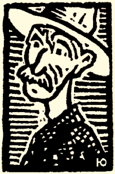
When a couple of old prospectors, after scourin' this desert forty years for gold, decided to split up it's a serious problem. The scrap started thirty-nine years ago and now that Sonora Bill has gone stone deaf and his answers don't fit Charley's arguments there weren't no more pleasure in scrappin'.
There was plenty of well-meaning advice on how to divide their outfit. We agreed that Honest Ed Fixit had the solution. Ed flips a coin and tells Sonora Bill he's the one to divide the outfit ... There was two burros—Bill stacked up the two piles into what he figured was half and half, kinda thinkin the stuff he was pilin' alongside Diana might be his, 'cause Charley never liked her since she chewed up the deeds to his pet claim.

Philosphizin' Ed says to Charley: "Pick the pile you want." Charley says, "I'll take all that pile except the burro,—I want to switch and put General Pico in place of Diana." That was the finish of Honest Ed's plan. You're right, it ended up by chopping everything in two parts.
—"My Column" in the Monrovia "News-Post"
. . . Whiskers . . .
rangin' from Maltese to tobacco-juice roan, and bein' folks that talk only about what they know and see, they've gone over this whisker business a number of times.
He says here's the result of the last combing: Whiskers is worn most by high-brows and low-brows, extremes both ways. They seem to come with thinkers; the low-brow tells you what he thinks while the high-brow deals somebody else's thoughts. As to the beards themselves we can't see there's much difference. We come to this conclusion last fall when Gopher Joe was piloting round that high-powered archeologist who come all the way out here from Washington to look for little Indian beads, cause both their beards looked like they came out of the same litter.
Shakespeare, Longfellow, Cabrillo, Balboa and Santa Claus had champion beards. So did Jesse James, the Captain says.
—Rob Wagner's "Script."
Page 3 D E S E R T R A T S C R A P B O O K Fall Edition, 1946
Harry Oliver's
Argument Starters
"Roadrunners kill rattlesnakes."
•
Desert turtles live a hundred years.
•
The loudest noise in the world is thunder.
•
The horned toad is not a toad; it's a lizard.
•
The Vinegaroon is half spider and half scorpion.
•
Animals are wild because man has made them so.
•
The largest gold nugget ever found weighed 630 pounds.
•
A cubic foot of gold weighs more than half a ton—1203 pounds.
•
There are many kinds of cactus that will not grow in the desert.
•
A lightning-flash lasts approximately one-millionth part of a second.
•
Horsehair rope as a barrier to stop rattlesnakes has been proved a myth.
•
One pound of honey represents the life time work of more than 1,000 bees.
•
A mule knows three times as much as a horse, and a burro is smarter than a mule.
•
The Indian population in the desert is steadily growing—from 8,000 to 45,000 in 60 years.
•
Needles of the prickly pear cactus are cut to size, shaped, polished and sold as phonograph needles.
•
Each rattlesnake helps man by killing off between 100 and 150 rats, mice, gophers and ground squirrels every year.
•
The dried stalks of the desert yucca are gathered and sent to a factory in Brooklyn, New York, for the manufacturing of artificial limbs.
•
Horned Toads sometimes lay eggs and other times will give forth living young. It seems that the mother can't quite make up her mind.
•
Over 3,000 different herbs and plants for therapeutic use were grown in Montezuma's Mexican botanical gardens years before the discovery of America.
•
It is estimated that half a million snakes and twice that number of lizards were killed for their skins and turned into shoes and purses last year for milady's fancy.
•
The department of education in Mexico wants the children in that country to look to the old Aztec god, Quelzacoatl, for their presents each Christmas, rather than Santa Claus.
•
Many old prospectors have been saved from thirst by the water contained in the famous barrel cactus. Today this barrel cactus furnishes the base for some of the noted cactus candies.
•
Wrinkled inhabitants of the desert shake their heads and whisper startling exaggerations when you ask about the Jumping Cactus (Cholla); nevertheless it does jump, but only when stirred by the swish of your pant leg or coat sleeve.
•
INDIAN NAMES. In the matter of geographical names the contribution of the Indian is conspicuous. At least twenty of the states comprised in the United States bear Indian names, while for rivers, lakes and towns, the list of Indian names is in almost equal proportion.
 The Gila Monster is not as dangerous as reputed. Scientists have discovered that if they would brush their teeth they would not be poisonous at all. (Seems they haven't listened to Bob Hope's program.)
The Gila Monster is not as dangerous as reputed. Scientists have discovered that if they would brush their teeth they would not be poisonous at all. (Seems they haven't listened to Bob Hope's program.)
The Navajo Indians use the markings on the backs of the Gila Monsters as a pattern for their rugs. An old timer here has a pet Gila Monster with a swastika on its back, and says it's "Sure pizen."
GILA BEND, ARIZONA
—From "My Column" in the "Bisbee Evening Ore," July 30, 1940
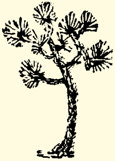
Mormons named the "Joshua Tree" because like that patriarch, to them it seemed to point the way from the wilderness to the Promised Land.
40 YEARS ON THE DESERT'S EDGE
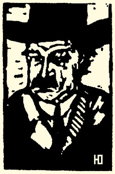 Interviewed an old time horse doctor who has had many strange call in this country, and I sure helped him to remember the oddest of them.
Interviewed an old time horse doctor who has had many strange call in this country, and I sure helped him to remember the oddest of them.
He told me how a woodpecker broke the leg of an old timer that stayed at the local hotel. It's rat-a-ta-tat woke him and in trying to scare the woodpecker away he forgot he was in a two-story building and not in his shack.
He told me about the time Homer Archer let a big red apple get the best of him. His jaw bone slipped out of place when he attempted to take a man's sized bite.
Then he tells me about a hunter from Glendale who was bitten by a skunk, and he said it gave him Tularemia, whatever that is.
Riding home on the crooked road I darn near died of (dirtywindshielditis) myself.
"Desert Brief" in Monrovia's News-Post
Toad Watson's Christmas
BY HARRY OLIVER
NEW MEXICO MAGAZINE, DECEMBER, 1942
Toad Watson looked at the calendar on the wall of his shack. It was Dec. 24, Chirstmas Eve. The fire was low, it was time to hit the hay. As he took off his socks, he smiled. He would hang them up over the fireplace; yes, and he would make sure there was something in them when he awoke in the morning.
He gathered up small objects from round the room, filling his socks; a bright red toothbrush handle and a green comb looked Christmasy all right. In the bunk he muttered a Merry Christmas. That was to the shack, I guess, because he had no cat or dog and his nearest neighbor was 20 miles away.
In the morning as he awoke he looked to the fireplace and played at being surprised.
Then he looked again with real surprise—the bright red toothbrush handle and the green comb were gone. Puzzled, he sat on the side of the bunk trying to think. Had he dreamed of putting them in his sock? Looking around the room for them he whistled and wondered.
"Well," he said aloud, "I don't need the toothbrush or the comb that much nohow. Let's see what else you took."
As he unloaded the first sock, he spotted his glasses. "Whoop!" he yelled, "Thank you Santa, wherever you are. Did you find them on the trail?" Then he came onto a pair of tweezers he'd lost three years ago. That stopped him.
Whistling as he made his coffee, he kept figuring and figuring about this Santa Claus that gave him his glasses on Christmas. Then it came to him with a bang—"trade rats!" Yes, the rats had his comb and toothbrush and had brought back his glasses and tweezers. On Christmas, too.
Toad Wilson went to town and had a Christmas dinner with the money he'd been saving to buy new glasses. He sure was happy. He says, "You can call 'em pesky pack rats, trade rats, or swap rats, if you want to, but to me from now on they're Santa Claus' little helpers."
DESERT STEW
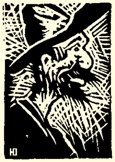
 A party of tourists came to the camp of two old desert prospectors (they had missed two meals) they were fed stew and honestly believed it the best they had ever tasted. One stout lady tourist offered twenty dollars for the recipe. The prospectors wanted the twenty bucks but the stew had been stewing for three weeks and the prospectors had alternated each day so as each could use his imagination for a change of flavor daily. They got the twenty by giving the old gal a can of the stew and a letter to Charlie the Assayer, telling him to assay the stuff.
A party of tourists came to the camp of two old desert prospectors (they had missed two meals) they were fed stew and honestly believed it the best they had ever tasted. One stout lady tourist offered twenty dollars for the recipe. The prospectors wanted the twenty bucks but the stew had been stewing for three weeks and the prospectors had alternated each day so as each could use his imagination for a change of flavor daily. They got the twenty by giving the old gal a can of the stew and a letter to Charlie the Assayer, telling him to assay the stuff.
—"My Column" in the "Vanguard," Venice, Cal.
The San Juan River was completely dry for a day. A rancher and his family with the aid of screw drivers, knives, and other sharp implements cleaned out the crevices in the river bed for half a mile each side of their ranch. The gold was panned and netted seventeen hundred dollars. The next day the river was flowing again, and hasn't been dry these sixteen years since.
BOREGO DESERT
SAN DIEGO COUNTY, CALIFORNIA
Twenty-five peg-legs have been found in this desert valley, and a mine put up for sale after each find.
"Peg-Leg" or Thomas I. Smith (of the famous Lost Peg-Leg Mine) was the brother of the famed early adventurer, (Jedediah Smith) and lost his leg through an amputation, following a bullet wound from an Indian's rifle.
Peg-Leg died in a Los Angeles saloon during a row back in 1880. For 60 years desert prospectors have looked for his famous lost mine, west of Yuma and south of San Bernadino.
—From "My Desert Briefs" in Glendale News-Press
You can hardly write a lie but what it is, or has been, the truth sometime in Tombstone. Tombstone had almost as many tourists in the old days of our west as it now has. The tourist wants lies, I wanted lies and was taken to an eighty-year-old champ, to hear of the "Lost Skeleton Canyon Loot" and other lost treasures of gold, of bad men, boot hill, stage robberies and old time killings. He sat in the sun and smiled as I walked toward him. "Hello, old timer," I said, "You've done a good job of growing old, tell me how."
 He told me the way to grow old is to pay no attention to it. Some men retire from business at sixty or so, build bungalows in L.A. and do nothing ever afterward but sit on the front porch and listen to their arteries hardening. That's a bad thing.
He told me the way to grow old is to pay no attention to it. Some men retire from business at sixty or so, build bungalows in L.A. and do nothing ever afterward but sit on the front porch and listen to their arteries hardening. That's a bad thing.
I agreed, but wanted some of his famed lies, so as to get him started let go a (come on) "I should think, by the look of things, that nothing ever happens here." "Oh!" he answered, "It's a pretty lively place for its size—why it's not two weeks since we had an eclipse of the moon!"
—"A Desert Brief," Culver City Star-News
Dry Camp Blackie of Buzzard's Gap is as perturbed as an ambidextrous sidewinder. Says the buzzards are almost scared out of this desert valley.—The aeroplanes scare them.
He has been watching a pair that nested up in the gap—says that lop-tailed egg hatched into a baby buzzard with two tails, it's Ma was scared by a P-38.
—"Limelight News," Palm Springs
Using Blackie as a Guinea Pig
Way to stop wars is to quit lending money to other nations. That's the way I got Dry Camp Blackie to stop drinking.
—"The Desert Sun," Palm Springs, Dec. 21, 1948
Page 4 D E S E R T R A T S C R A P B O O K Fall Edition, 1946
Harry Oliver's
DESERT RAT Scrap Book
The Newspaper That Grows As You Turn Each Page Excepting Page 5
RIP-SNORTIN'
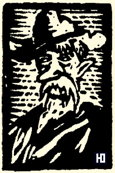 We always called him Rip-Snortin' because he is and was a two-fisted drinker. Back in the old days he used to mix Sloan's Liniment with his whiskey so's he could tell he was drinkin'. After prohibition he was happy for a while because that white mule bootleg stuff seemed to agree with his in-ards. Then to get a scratch out of his liquor he took to puttin' sand burrs in it.
We always called him Rip-Snortin' because he is and was a two-fisted drinker. Back in the old days he used to mix Sloan's Liniment with his whiskey so's he could tell he was drinkin'. After prohibition he was happy for a while because that white mule bootleg stuff seemed to agree with his in-ards. Then to get a scratch out of his liquor he took to puttin' sand burrs in it.
He says tequila ain't too bad if you sit on cactus while you're drinkin' it, but after three days of drinkin' and settin' you get used to it.
It was old Fig Tree John that told Rip the story about the jumping cactus drink the Indians call Hello Hell. Twenty-two Indians got together on a party once with just enough Hello Hell for a few drinks around. Two drinks apiece put them dead asleep like as if they'd been drugged. It was one of them fifteen-minute parties. Well, eleven days later eleven of the twenty-two woke up and buried the other eleven, took another drink and went off to sleep again. No sooner did the grave digin' lot pass out than the lot they buried woke up, heaved the dirt off their chests and buried the eleven they found layin' around loose, leavin' the place tidy-like.
Rip Snortin' gets the instructions for makin' this brew and thinkin' he's on the way towards a real drink, goes to his cabin on the ridge of Sleepy Mountain and starts manufacturin' it.
The one thing Rip likes better'n his liquor is that runt baby burro of his. He trained it to paw three times and heehaw so's to get a lump of sugar. The burro was good at it, and Rip could do his part no matter how hard he'd been drinkin'.
Well, the night for tryin' that Hello Hell drink comes and Rip hits it with one drink after another not carin' much if he did sleep away some of his time like Fig Tree John says he would, because no one ever come up on the top of the mountain to his mine anyway. But he did hide the shovels, not wantin' to be buried, and after tyin' up the baby burro he put out enough hay to keep the runt goin' for eleven days. Bein' set for emergency after he gave himself over to keepin' close account of the way that jumpin' cactus stuff acted, till he lost consciousness.
It's hard to tell how long Rip did sleep, but when he woke up snow was blowin' in from the ridge thru a big sag in the cabin door and he was froze stiff. He pulls himself to the door and looks for the baby burro, but all there is is the piece of ragged wet rope hangin' from the post. Rip figures maybe the runt is around by the sugar can, and finds signs of philanderin' rats but no burro.
Rip's burnin' up inside and cold as ice outside, so he starts down the mountain for the Busy Bee store where he can reverse them conditions.
Now in good weather it takes about four hours to come down the mountain. Rip's watch had stopped and wouldn't start when he wound it, like it was paralyzed from not bein' used. Of course, his trail down the ridge was lost in the snow drifts, but Rip had been down there too many times to worry about losin' his way. He keeps goin' down he side of the mountain till way after dark. Soon he sees a lot of lights ahead and can't figure them out.
"Well, I'll be blowed!" he says. "What's happened to Borego Valley?"
Then he hits a highway. "Paved roads," he says. "What hombre coulda paved that in eleven days?"
Next he comes to some date trees and gets sick all over, so sick he has to sit down. Figurin' how Pat Boomer was the only one that had planted dates in Borego, last he remembered, and how these big trees are an old stand, bearin' in their prime, he knows he musta slept fifteen years or more. It's not far from Pat's place to the Busy Bee store, but everything looks different now.
Rip goes on down the road, gettin' dizzier with each step. There's lots of date farms everywhere and not far ahead a town. Yes. A town has grown and automobiles are thicker than hornets. He drags himself along feelin' mighty old with the fifteen years he's slept and sayin' to himself he's had all the drinkin' he'll ever want in that one last spree.
When he gets to the town he asks, "Where's the Busy Bee store?"
Is it supposed to be in Borego Valley?" one in the crowd asks him.
"Well," snorts Rip, feelin' older by the minute, "it always has been."
With that the fellow throws back his head and laughs. "You're way off," he tells Rip, pointin' up. "See that mountain there? Well, if you go to the top of it and drop down the other side you'll come to the Busy Bee store."
Rip was laughin', too, when he finally got back to his place on my counter. He says he bet there's a lot of women wish they could get rid of fifteen years that quick.
Rip Snortin's right boastful since that experience of his, and spends a lot of time around the store, tellin' folks he's the only one that's had a real look into Borego's future.
—From "Life" magazine, August, 1932.
ADOBE
say the good old time well-made common adobe brick (if well roofed) is good for about 300 or 400 years.
So, if you want to plan for 500-year job, why spend your money with the big oil company?
It is said that if Mexicans sing as they make adobe bricks for a home the home will always be a happy one.
No. 1 Clown
of the desert country
Randall Henderson says
in His DESERT MAGAZINE, June 1945
On display in the Desert office is an 18 "karrot" gold nugget from Lost Pegleg Mine No.999, We are indebted to Harry Oliver—No.1 clown of the desert country—for this gorgeous hunk of the "precious metal."
The nugget looks and feels suspiciously like the replica of an ordinary bunch of carrots (18 of them) done in plaster paris and then lacquered with a few coats of that gold paint you buy in the store.
This is the same Harry Oliver who manufactured several scores of wooden peglegs, finished them with a sort of weathered appearance, and then planted them in various caves and "coyote" holes in the Southern California desert. That was many years ago, and the desert prospectors are still bringing in proof that Pegleg Smith carelessly left his artificial leg behind when he prospected this country and discovered the famous Pegleg mine.
Oliver began his desert career as a homesteader in Borego valley, did a tour of duty as art director at Hollywood, and returned to the desert to "live like a human being." He now has a roadside stand at Thousand Palms junction on Highway 60-70-99.
He wears a set of whiskers like Steve Ragsdale. In fact the resemblance is so great that a Coachella valley newspaper once ran a picture of Steve to illustrate a story about Harry. Strange things happen on the desert when Harry Oliver is on the prowl.
Gold
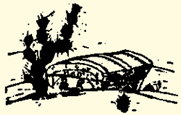 The old desert prospectors who search desert sands for gold want only the fun of finding it, not what gold will bring them—but it's strange how much they know of gold. I was given this to read by an old-timer here today. Since 1492, the year Columbus discovered America, the total amount of gold produced in the whole world has been twenty-two billions and a half. But today, in gold money and bold bullion, there are only twelve billions of this vast amount accounted for. Where is the rest, the vanished ten billions? Much of it has gone into industry. Fortunes in gold leaf have been laid in the crosses and domes of churches, cathedrals and mosques.
The old desert prospectors who search desert sands for gold want only the fun of finding it, not what gold will bring them—but it's strange how much they know of gold. I was given this to read by an old-timer here today. Since 1492, the year Columbus discovered America, the total amount of gold produced in the whole world has been twenty-two billions and a half. But today, in gold money and bold bullion, there are only twelve billions of this vast amount accounted for. Where is the rest, the vanished ten billions? Much of it has gone into industry. Fortunes in gold leaf have been laid in the crosses and domes of churches, cathedrals and mosques.
Gold is restless and everlastingly seeks a change. It changes its form and place, and yet endures. For even the gold setting of a woman's bracelet or the gold in a man's watch may once havce glittered from the walls of Solomon's temple, or shone on the shaven heads of the priests of Isis in old Egypt, or have been snatched from some burning city of the Spanish Main to the tragic accompaniment of the shrieks of dying men and the screams of captured women.
—San Pedro "News-Pilot"
RENO NEVADA
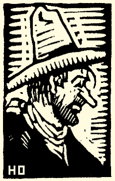 Just drove in from Carson City. God made this beautiful country, but man made the dangerous curves (in the highways). Speaking of curves, there is a fine crop if divorcees here right now ... always a lot of romance, mostly broken romance, here.
Just drove in from Carson City. God made this beautiful country, but man made the dangerous curves (in the highways). Speaking of curves, there is a fine crop if divorcees here right now ... always a lot of romance, mostly broken romance, here.
Reno is the city of opportunities ... I met a fellow that came here broke and now owes me $50,000.
Complimented an old timer on his ten gallon hat. "Yeah, I bought it five years ago; had it cleaned three times, changed it twice in a restaurant, and it's still just as good as new," was his reply.
Propaganda—How do you account for the fact that a beginner is sure to win in a poker game? "Confidentially speaking," said the manager of a night spot, "the explanation is that it's not a fact. We encourage the superstition so as to get the tenderfoot interested."
Give a newcomer to Reno two drinks and a 10-gallon hat and he will forget all about his divorce while the music is playing (if it's the right kind of music.)
—"My Column" in the San Pedro "News-Pilot."
Dewey Wallace, well known date grower, drove a round peg in a round hole. The hole was in his wooden water tank and the peg was a freshly cut piece of tamarisk. That was several months ago. Yesterday the water quit coming out of the tank and he discovered that the roots from the tamarisk peg had stopped up the pipe. Also the bloomin' tank was covered with branches—Dewey is letting them grow, hoping the tank will stretch out to where he can saw off a couple of new ones.
—"Limelight News," Palm Springs
![]()
I would say about 99,999 girl babies were named Barbara, after the character Barbara of Harold Bell's novel, "The Winning of Barbara Worth." "Yes," most of them are grown up.
• Calexico, Imperial County—Overheard at the De Anzo hotel here: A woman asking an idle WPA worker how come he was always looking for a job and never finding one. The WPA worker replied, "That's skill, woman, skill."
Then a surgeon said that a man can be cured of the liquor habit by a minor operation. Something simple, like, for instance, cutting his throat?
Another fellow charging a drink at the bar says he thinks he will come out about even, as he owes just about as many people as he does not owe.
A highlight in a political argument: "These days and in this country, an atheist is a person who doesn't believe in Roosevelt."
After I told I was writing this column the fellow that was coming out even said, "We have two kinds of columnists—those who tell us what everybody knows, and those who tell us what nobody wants to know.
• Palomar Mountain, San Diego County—The highest and lowest spots in America are within eighty-six miles of each other; they are both in California.
It is the belief of modern scientists that the Arizona meteor, when it crashed, lit in an inland sea which formerly extended through Antelope valley and nearly to Salt Lake. The crash caused its waters to suddenly pour out through the Grand canyon and disappear.
In the same smash the San Jacinto mountain was squeezed out of the flat floor of the desert. It is the newest mountain in the western hemisphere, and can still be heard grinding and settling.
According to Uncle Sam's recent checkup, our mountains are on the move. Many mountain peaks have moved as much as ten feet, and they have moved in various directions.
This fall edition published the middle of April is Volume 1 number 1. (You see I have given myself time to see if it is going to sell. Should it sell, may have to put out a summer edition 1946 and I dont' know what it would be. Surely it would be Volume 1 but as to number I might have to use a (1/2) half sign. It is a strange newspaper isn't it?
•
The desert smoke tree has promised companionship to many a desert wanderer. It's the deserts' one mirage that's always at work (a mock camp-fire).
•
A miner here tied a stick of dynamite around his neck and lit the fuse. Relatives and friends say they can't imagine why he did this. Of course this is only a theory, but he may have been tired of living.
THE 1ST EDITION CARRIES NO ADS. FUTURE EDITIONS WILL ONLY CONSIDER ADVERTISING COPY THAT WILL ADD COLOR BEYOND THE ABILITY OF THE EDITOR. SO IF YOUR ADVERTISING COPY IS BETTER READING THAN MY STUFF SHOOT IT ALONG!
Pack Rats and Dope
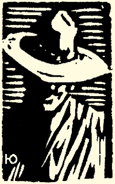 Lo Young, the cook at the Gray Sage Ranch, has a black eye and a bump on his head as big as a hen's egg, an' there's an ornery cuss got up early this morning what can just be seen goin' over the top of the Bad Land hills on his horse, back-trackin' for the border.
Lo Young, the cook at the Gray Sage Ranch, has a black eye and a bump on his head as big as a hen's egg, an' there's an ornery cuss got up early this morning what can just be seen goin' over the top of the Bad Land hills on his horse, back-trackin' for the border.
Here's the story as how I put it together:
Last night at sundown, a tired, greasy, low-down lookin' hombre came up to the Gray Sage Ranch on a buck-skin hoss with his hat pulled down over his eyes, turned his hoss into the corral, got a feed for himself an' after throwin' his saddle bags under the bunk, hit the hay.
Then along about the time the coyotes quit yappin', havin' finally got paired off for the evenin' in comes two cars full of government agents lookin' for smuggled opium.
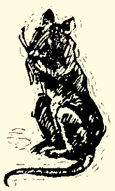 They goes to the bunk-house with their guns three feet ahead of' em and gets this hombre's saddle bags. And this is what they find in'em: Dry hoss'turds. Yes, sir, that's all just hoss'turds. Now, what do you think of that?
They goes to the bunk-house with their guns three feet ahead of' em and gets this hombre's saddle bags. And this is what they find in'em: Dry hoss'turds. Yes, sir, that's all just hoss'turds. Now, what do you think of that?
Well, they can't take this hombre in 'cause the government ain't never been able to do anything about hoss'turds in a legal way, and they can't find anything else on him, so they turn around and leave.
After the government autos have pulled out the hombre calls in Lo Young, thanks him, gives him a big wink an' a ten-dollar bill sayin' he'll be leavin'.
Well, that's when Lo Young got his. This hombre stands there waitin' for Lo Young to give him back his dope, but Lo Young says he don't know nothin' about it. First came the black eye, then the tap on the bean.
Most of the time them desert pack rats—trade rats, they call 'em some places—is pesky little critters, makin' off with a fellow's false teeth or anything else that's shiny, but they allus put something back in trade for the stuff they make off with. Even if it's hoss'turds.
It beats me how they know them coppers was comin', but that's a rat for you—desert or city.
—From Rob Wagner's "Script," May 12, 1934.
INDIAN HUMOR
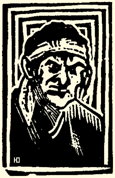 Pyramid Lake, Nevada—My Piute Indian guide has a fine sense of humor; he told me today that his field glasses were so high-powered that anything less than ten miles away looks like it's behind you. Told me of a great painter that stayed here ... The painter would tell the tourinst ... "I paint a picture of the Pyramid Lake in two days and think nothing of it." The guide said, "They, the tourists, thought nothing of the paintings also."
Pyramid Lake, Nevada—My Piute Indian guide has a fine sense of humor; he told me today that his field glasses were so high-powered that anything less than ten miles away looks like it's behind you. Told me of a great painter that stayed here ... The painter would tell the tourinst ... "I paint a picture of the Pyramid Lake in two days and think nothing of it." The guide said, "They, the tourists, thought nothing of the paintings also."
My guide said last year he told a lady tourist from Boston that this desert is God's own country. The lady tourist answered by saying, as she rattled around in the back seat of the car, "I'll say he certainly done his best to discourage trespassers."
—From my daily column "Desert Briefs"
The Pack-Rat
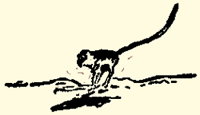 Desert packrats are noted as traders, often leaving some small worthless article, such as a chip or pebble, in the place of something that pleases their fancy. A rancher attempted to kill off some packrats with poisoned wheat. A few days after he had placed the wheat he went to his kitchen for some rice. In a sack scattered among the white grains were a lot of brown ones—poison wheat. The packrats had done some trading.
Desert packrats are noted as traders, often leaving some small worthless article, such as a chip or pebble, in the place of something that pleases their fancy. A rancher attempted to kill off some packrats with poisoned wheat. A few days after he had placed the wheat he went to his kitchen for some rice. In a sack scattered among the white grains were a lot of brown ones—poison wheat. The packrats had done some trading.
—"My Column" in Bisbee Evening Ore.
It's a fact, that the Mexican national coat of arms was originated before Columbus discovered America.
 Prevention of cruelty to vegetables was the big news story here today. After much discussion the authorities proved that the Mexican Jumping Bean has a nervous system, and doesn't like being placed on hot plates—sunshine jumping was said to be O.K.
Prevention of cruelty to vegetables was the big news story here today. After much discussion the authorities proved that the Mexican Jumping Bean has a nervous system, and doesn't like being placed on hot plates—sunshine jumping was said to be O.K.
Bats have been used to send messages across the border. Like homing pigeons, bats will return to the cave from whence taken. Smugglers liberate them after contraband is delivered.
—From my book "99 Days in the Desert," published by Guy A. Genung print shop, Corona, California
ROB WAGNER
. . . . in SCRIPT said
APRIL 20, 1940
Another Scripter LandsScript contributors are always clicking in high places. Remember those lively little tales illustrated by the author, entitled "Desert Rough Cuts"? They were Harry Oliver's desert stories and pictures of Borrego Valley. Well, recently Harry received a letter from the president of the International Mark Twain Society which read:
Dear Mr. Harry Oliver
In recognition of your contribution to the field of American humor, it gives us great pelasure to inform you that you have been elected to Hororary Membership.
Yours sincerely, (signed) Cyril Clemens—The names of the other members show that Harry is
now listed among the immortals of American humor.
—Ye Ed.
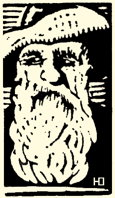
Old Man West Had One Smart Son
Nogales, Ariz—A few months ago old man West died here at Nogales. His two sons, Ted West, a newspaperman, and Bill West, a paper-hanger, received $20 from the small estate. Bill, the paper-hanger, deposited his in the savings bank, where it still remains. Ted, the newspaperman, had always had a great yen for tequila in fancy bottles, and expended his heritage in the purchase of a grand array of the fanciest he could find. He had just finished drinking these, and has sold the strange, fantastic, empty bottles to a tourist for $360.
—Los Angeles "Times"
Met a different kind of prospector today, called himself Kashin Dizert, he finds his kind of gold everywhere, he says he sends yucca stalks to the factories in New Jersey to make artificial legs out of, ships cactus to Europe, sends lizard and snake skins to the shoe factories in Mulwaukee, and desert holly and mistletoe at Christmas time to New York and live horned toads to Boston.
He digs up trapdoor spiders' nests, trapdoor, tunnel and all to send to a curio dealer in Denver, sells mineral specimans and petrified wood and sends eagle feathers and hawk feathers to the women folks hat stores back East.
Kashin cuts stickers for phonograph needles; he has planted forty acres of jumping beans and is now trying to make dill pickles out of cactus.
Singin' in The Wind
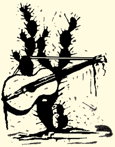 Singin' Bill Whistler, an old-timer, told how he worked for years in the city, made a lot of money, and got all bent over counting it. His Doc said he ain't got three months to live, and not that much if he don't go to the desert to live'em. He hears a bum playing a guitar for drinks and thinking he's never had time for music, he would like to pass along out of this world listening to it. The bum tells him he ain't never had enough good whiskey, and if he will furnish the whiskey he'll furnish the music, and they will pass out together.
Singin' Bill Whistler, an old-timer, told how he worked for years in the city, made a lot of money, and got all bent over counting it. His Doc said he ain't got three months to live, and not that much if he don't go to the desert to live'em. He hears a bum playing a guitar for drinks and thinking he's never had time for music, he would like to pass along out of this world listening to it. The bum tells him he ain't never had enough good whiskey, and if he will furnish the whiskey he'll furnish the music, and they will pass out together.
According to agreement, the bum got his whiskey—got too much—and our sick man got to sitting in the sun a'picking on that guitar.
He's a'thinking how that cactus has got hundreds of years to live and he's got to go some to learn more'n one tune in the time allowed him, then he gets so interested he forgets to tear the pages off the calendar and pretty soon the first he knows he'd been dead two and half months, according to the doctor, and can play six tunes darn well. That was fourteen years ago, and yes, the bum's quit drinking.
—From my book, "Desert Rough Cuts."
A hundred thousand years from now all the stars in the little dipper will still be observable from the earth. They will no longer form a dipper; they will be in a jagged line.
I guess you've seen them automobile advertisements with white horses lookin' over fences at the big green autos goin' by. Or maybe what you remember is them pictures on calendars with white goats in front of purple mountains, or maybe a white Persian cat on a vermillion pillow, or white pigeons in the hands of a woman in orange. Anyway, if it's a good picture and got white animals in it and bright colors sprinkled around, look for the name Jess Wright in the corner.
This Jess Wright—Cussin' Jess White, we calls him—come to Borego valley two years ago and buys himself a place over near Clark Lake where the flamin' Ocatillas is the biggest. Then he builds the finest 'dobe this side of Guadalajara. He paints them 'dobe walls whiter than snow and they look like fresh stacks of marshmallows. He don't stop with white paint, either, but starts cartin' in white animals, white thoroughbreds all, saddle horses, dogs, goats, chickens, a pair of white peacocks, some of them milk-white pigeons an' the biggest long haired uppity pearl-white cat I ever seen. That fool cat was so high-falutin' she wouldn't even speak to the peacocks, and they was lordin' it over everybody else.
Well, one day Jess comes over that short-cut back of the store on one of them snowy horses and wants to know can he borrow Haywire Johnnie to take care of all them white critters of his, sayin' he's goin' back to New York to show his paintings.
There ain't any too much for Haywire to do here in the summer, so he makes a deal with Jess and I'm to drive him in to town the next day.
Jess talks about them thoroughbreds all the way to town, just like they were his children, and says how he give Haywire full instructions about feedin' and waterin' but forgot about the cat. Says he'd have to write out a letter for Haywire and I could take it back.
Well, I got to see Haywire a few times that summer but not like usual. He was too busy following the instructions an' lookin' after that cat, for she hade lost some of her snootiness an' got to travellin' around the valley some.
The week that Jess Wright was to come back I go up to help Haywire clean everything, knowin' how particular Jess is that all's to be white.
We whitewash the coops, kennels, and corrals, scrub the horses and dogs till they're white as chalk, and Haywire, to make it a double surprise, fixes a nice white box for the cat and her kittens who must have took after a Pa whose family did a lot of cross-breedin', they had so many colors and different kinds of spots.
Jess Wright stops at the Busy Bee as he comes back to the valley, and asks about all his critters and takes me out to see his brand-new car. He gets to jabberin' about prize-winners and aristocrats and there on the back seat is a box with a great white tom cat.
Jess says proudly, "I sent clear to England for him. I hope Tabb likes her new playmate."
Then an' there an awful thought struck me. As soon as he's gone I ducks for the house to get my go-to-town coat and find that letter. I'd clean forgot about deliverin' it to Haywire. It's a long letter tellin' about Nell's family tree an' how to keep her happy locked up in that wire screen cage of hers.
Haywire is still workin' for Jess—and says Nell's livin' down her disgrace. Jess even kept one of them white kittens with the red ear. He says he wants at least one red ear around to hear him cuss about the blot on the escutcheon.
"Durn it!" says Haywire. "I can't see there was much damage done. With Cussin' Jess Wright always surrounded by them pictures of his and always workin' for contrast it ain't so strange that Nell got the idea too."
—From "Grizzly Bear" magazine, Feb. 1934.
Fame For Nothin'
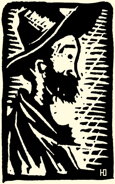 Thirteen years ago, Lem stops at the store an' asks me if this is Nowhere, California. I says no, but allowin' me a circle of a hundred feet the rest for miles in every direction, is just nowhere in particular.
Thirteen years ago, Lem stops at the store an' asks me if this is Nowhere, California. I says no, but allowin' me a circle of a hundred feet the rest for miles in every direction, is just nowhere in particular.
"That's better yet," says he, "I'll stay." I thought him strange then, but I know him now. He's a sort of desert efficiency expert; goes around figurin' on what he can do without.
Seems the first thing he eliminated was his background, his family had wore themselves out carryin' around a lot of choice junk they brought out from Arkansas by oxcarts in the forties' an' what they had picked up since. He was born in to that mess of stuff and hated it, so soon as it become his he unloaded it as quick as he could. Then the elimination idea got hold of him and he couldn't stop. He makes a clean sweep of the relations, shakes off the wife, gets clean rid of the mother-in-law, unloads the house and lot, discards the auto, ousts the cat, discontinues the insurance and his mailin' address, drops religion, clears the deck of friends, an' bails out his business.
Ever since his pickin' Borego as a place to live he's made progress on this doin' without idea, he says you can't wash a lot of dishes if you only got one plate, one cup and no saucer. Lem don't do a thing much but do with-out, says 99 per cent of our trouble could be done away with if we wouldn't accumulate. Everybody likes Liminatin' Lem and his preachin' but it weren't till a big song writer feller come all the way out here from New York that we knew how powerful his preachin' was. He'd heard about Lem an' tells me one day that Lem's been livin' the life and lyrics of a song he wants to write.
Now, lots of people have had songs writ about'em 'cause they did somethin'—stood on a burnin' deck—made goo goo eyes—ran out of bananas—or headed for the last roundup, but Lem gets into this song cause he don't do nothin'; ain't got nothin' and don't plan on doin' nothin' but nothin'.
I sees that he meets Lem, but Lem don't help at all, he throws this song writin' fella way off his track.
"First," says Lem, "why have new songs? The best ones is the old ones, and they're a darn site easier to remember."
Then Lem gets to provin' to this fella' and tryin' to convert him into believin' that it ain't worth while writin' a song and that he just came out here to this valley of escape to get away from things.
Well any way the song-writer sits down to the old piano complainin' about how it sounds, puts down a few dots on what Lem says is perfect music (just lines, empty lines). He don't get nowhere 'cause deep down he wants to live like Lem, an' hopes if he talks long enough to Lem he'll get nerve enough to chuck the whole struggle back east.
The hot weather, Lem's slow movin', sleepy way of sayin' there ain't no use doin' nothin', and a sage julep or two all helped to sell this fella on doin' nothin', till he could do it almost as good as Lem. So there weren't nothin' done about the new song.
Lots of folks can do nothin' in fast, short spurts, but nobody's been able to compete with Lem for very long.
This song-writin' fella' doin' well, a-stretchin' his legs just as far as Lem's and' had gotten to the point where he could look at the critters in the pasture across the way with-out countin' 'em. He was makin' progress.
Haywire Johnny stops it all one day by runnin' in an' handing him a city telegram.
Lem just looks up slow an' says, "don't open it—it's only trouble."
But he does, an' it was.
The people that prints his music want to know where the song is.
You're goin' to hear that song, you're goin' to hear it a lot. It's got a nice lazy swing to it—it fits Lem all right and here's how it got written.
All the time Lem and that fella' was arguin', or I better say agreein' about eliminatin' them flies was writin' the music, lightin' on them empty papers an' puttin' dots on an' between the lines. While this fella was packin' up Lem says, "Quick Johnny, get the Flit, if you don't them tobacco-chewin flies is goin' to load him down with a coupla operies an' he'll never escape."
—From my book "Desert Rough Cuts," Ward Ritcvhie Press, Los Angeles
Today I discovered the Navajo's greatest hate. They hate barb-wrie, never use it, don't like the people that do use it and they say white men make lots of bad things and wrap them up with barbed wire. They are very friendly with nature's barbed wire, the cactus, however.
I think as the Navajo for the use of barbed wire has taken all the beauty out of our American landscape. A barbed wire fence is a lot of spindle sticks with an imaginary something between them with stickers on it from a distance but a bunch of trouble close up. When the artist paints a fence, he paints a board fence, split-rail fence, picket fence or stone or adobe wall. Gosh, even a cactus hedge is better than a barbed wire fence, and besides those were my Sunday pants.
—A "Desert Brief"
Page 5 D E S E R T R A T S C R A P B O O K Fall Edition, 1946
OLIVER TWISTS
The only red menace in our desert is sunburn.
•
Dogs wag their tails when happy,—cats when angry!
•
TICKS are left hand thread (very seldom right hand threaded).
•
It was Burbank who talked God out of putting stickers on cactus.
•
I find many Imperial Valley folks can tell a sweet potato from a yam.
•
Camp Note: Put popcorn in your flapjack batter—watch them flop over by themselves.
•
The only time a horse gets scared on the road nowadays, is when he meets another horse.
•
The water of Great Salt Lake, Utah, is a 22 per cent solution of salt. Too salty for dill pickles.
•
Mr. and Mrs. Joe Webb, of Coachella, say the termites ate up their bright new marriage certificate.
•
Horned toads live in perfect accord with rattlesnakes, prospectors, desert rats, birds and tourists.
•
"The wildest thing in the Wild West, is a mother burro, if her baby's safety is at stake."
•
"So many people in keeping their—chin up—raise it to just a convenient drinking angle."
•
"We cigarette and pipe smoking folks should give a thought to how we must smell to a SKUNK."
•
A high-powered real estate salesman, at Palm Springs, received from an easterner, a down payment on a MIRAGE.
•
Why don't those "detective story writers" use a meteorite in their perfect murder stuff? "SOCKO" it came from the sky.
•
A. A. Beatty, pioneer of Borego Desert, carries a spigot with which he is able to draw the water from the barrel cactus.
•
The desert tortoise is built for speed, even if he can't make it. His shell offers the least resistance to air, wind and water.
•
Pearls have been discovered in the great cactus of Arizona. (They're valueless, misplaced birds' eggs, coated like oysters coat real pearls.)
•
The auto hasn't completely replaced the horse. You haven't yet seen a bronze statue of a man sitting under a steering wheel.
•
The only kind of social security available to our forefathers was the root-hog-or-die variety. And they managed very well, thank you!
•
"The most valuable sense of humor is the kind that enables a person to see instantly what it isn't safe to laugh at."
•
Saw a rainbow here at night. "Moonbow," the girl friend called it. Gee, "Moonshine Rainbows," and song writers haven't used them yet.
•
Note on prospector's shack, "Would you please put out a little food for the cat? It will eat almost anything, BUT DON'T PUT YOURSELF OUT."
ADOBE
A 'dobe house is fireproof, if built right, and one story high; earthquake proof, dust proof, sound proof, heat and cold proof, rat and termit proof, oh, and yes, bullet proof and almost proof against bad design, due to the thickness of its walls and damned if they don't take on more character with age.
The government has put out some silly pamphlets on adobe construction, not worth sending for. Many people have wrong ideas about the French pounded adobe construction. A big oil company, I am told is making "super" adobe bricks to last longer, and let me
Continued on Page 4—It's a little unusual to start a story on Page 4 and ask you to go back to Page 4 but this is an unusual paper.
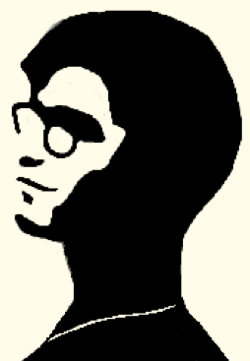
All text was hand-entered (no OCR scans) by Ric Carter (all of Harry's misspellings retained). Dick Oakes did the layout, markup and graphics reproduction, but not the contents, which remain the property of Bill Powers and his heirs.
